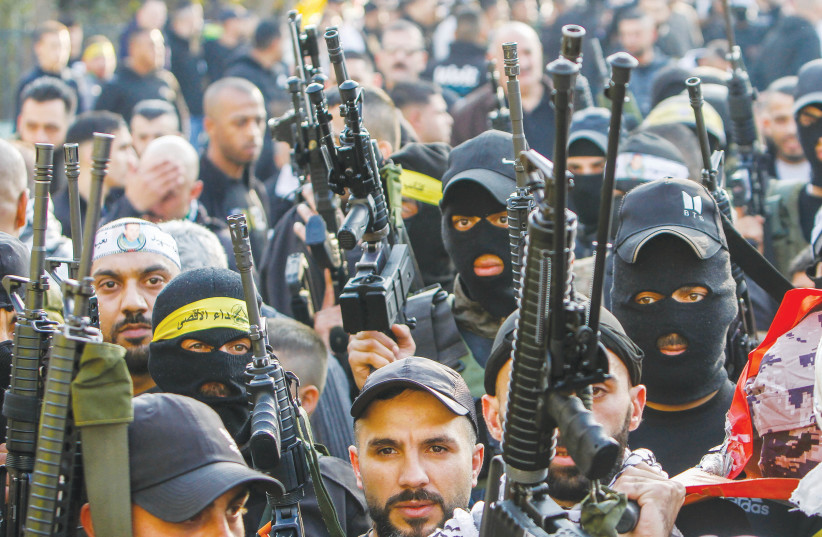Did Iran benefit or lose from Israel, Islamic Jihad fighting in Gaza? – analysis
Five days of fighting between Israel and Palestinian Islamic Jihad led to more than 1,000 rockets being fired at Israel and most of those that were a threat to civilians being intercepted. More than 200 PIJ rockets malfunctioned. For Iran, which backs PIJ as a proxy, the round of fighting does not seem to have produced any kind of victory that Tehran can point to – on the other hand, it may not be a loss for Iran either.
One piece of evidence for Iran’s feeling on whether it has achieved success is Iran’s pro-regime media. Iran today is not bragging the way it did before the May 2021 war between Israel and Hamas. Iran also isn’t bragging as strongly as it did after the round of clashes over Passover week when Iran claimed it had “unified” various fronts against Israel. Tehran’s talking point about the “unity” of fronts didn’t appear to achieve any results during the fighting between May 8 and 13.
What this means is Iran doesn’t seem to have operationalized Hamas, or gotten groups like Liwa al-Quds in Syria involved. In the West Bank, where Iran claims it has helped smuggle guns to groups in Jenin and Nablus, there were no large clashes either.
No unified Iranian command
This leaves serious questions about Iran’s abilities. Did Israel successfully isolate PIJ in this round, concentrate on achieving blows in Gaza, and prevent an Iranian attempt to spread the conflict? That could be one reading. On the other hand, another read on the outcome could be that Iran simply was not engaged and not planning for this and therefore was not only caught by surprise, but was unable to dictate the tempo.
Iran’s regime, in terms of work with its proxies, likes to plan in the long term. It invests over many years in growing the proxies and arming them and using them. But it can’t always be in control of them. It doesn’t appear to have a unified “operations” room for the “unity of fronts.”
 MEMBERS OF the Balata Brigade and the Lion’s Den display their weapons in Askar refugee camp in the West Bank. (credit: NASSER ISHTAYEH/FLASH90)
MEMBERS OF the Balata Brigade and the Lion’s Den display their weapons in Askar refugee camp in the West Bank. (credit: NASSER ISHTAYEH/FLASH90)That means that there isn’t a physical place where the Quds force commanders sit with members of PIJ, Hamas, Kataib Hezbollah, Asaib Ahl al-Haq, Harakat Nujaba, Liwa al-Quds and others. This means that in the absence of Iran and the IRGC Quds Force being able to decide beforehand that they want to “heat up” the fronts, they may not have the capability to work well as a concerted effort.
If we compare the five days of fighting that was Operation Shield and Arrow with the ten days of May 2021 and the several days of fighting during the Passover week this year, there are clear differences. In the lead-up to the April 2023 and May 2021 clashes, Iran used Ramadan to create tension and worked closely with Hamas. It was able to get groups to fire rockets from Lebanon and Syria in April 2023, and in May 2021 Iran ordered rockets fired from Lebanon and a drone used from Iraq.
Iran’s inability or decision not to coordinate is one feature of Iran’s possible failure over the last week. However, if Iran didn’t want to achieve anything then this could be seen as a draw, neither side achieving much. Israel views Iran as the main adversary in the region. This is known as a “third circle threat” and Israel has acted for a decade in Syria via the “Campaign Between the Wars” to prevent Iran’s entrenchment there. In the past, Israel has chosen to not operate in Gaza, such as in 2018, in order to focus on Iran’s threats in the north and further afield. This was clear during Northern Shield in 2018.
Iranian successes
Where might Iran have achieved success in the last week? The IRGC commander Hossein Salami recently gave a speech in which he claimed that the US and Israel’s power is declining in the region. This is Iran’s long-term assessment and considering this, Iran may prefer to wait and hope that the “decline” will occur.
Therefore it assesses that five days of fighting against PIJ, in which PIJ used around twenty percent of its rocket arsenal, is a short-term success to force Israel to focus on Gaza, while Iran continues to achieve results in Iraq, Syria and Lebanon. In this view, Iran may accept that these short periods of isolated clashes, in which both Israel and PIJ claim some kind of success, is in Iran’s interest. If Iran calculates that keeping Israel distracted with a focus on smaller groups like PIJ is in Tehran’s interest, then it will have seen the last week of clashes as an acceptable outcome.
For Iran, the next step will be to try to focus on PIJ rebuilding its arsenal and expertise in rocketry and keeping the possibility of a threat open to Israel via the PIJ proxy forces in Gaza and the West Bank. Since Iran largely sees PIJ as expendable or attrition-able units, it doesn’t mind a bit of attrition in Gaza. In this scenario, Iran may believe it has achieved success in the last week. It has once again tested Israel. Its proxy remains largely intact, with the exception of a few lost commanders and minus 1,200 rockets.





Comments are closed.